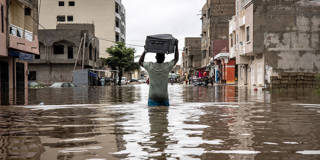The international community tends to think of antimicrobial resistance – an escalating global crisis in itself – as distinct from climate change. But mounting evidence indicates that adverse weather and rising temperatures can facilitate the emergence and spread of drug-resistant pathogens.
GENEVA – It is widely believed that climate change is the single biggest threat to human health. A global temperature increase of 2° Celsius – a threshold that will likely be exceeded by the end of the century – could claim as many as one billion lives, with extreme weather events, heatwaves, droughts, flooding, infectious-disease outbreaks, and food shortages among the causes of death. But the situation may in fact be far worse, because the current forecasts fail to account for the inevitable increase in antimicrobial resistance (AMR).
Climate change could have a profound effect on AMR, as evidence increasingly indicates that adverse weather and rising temperatures can facilitate the emergence and spread of drug-resistant pathogens. But models seeking to gauge the health effects of climate change disregard the growing risk of drug resistance, as do policy responses to global warming – a massive oversight that will hinder our ability to treat infections and keep people healthy.
Despite increasing the likelihood of extinction for nearly 11,000 species, a warmer planet could actually improve conditions for bacteria and fungi. Higher temperatures are associated with increased bacterial growth and infection rates, and can also put selective pressure on microbes to mutate and develop antibiotic resistance. One recent study in China found that each 1°C increase in air temperature was associated with a 14% increase in drug-resistant Klebsiella pneumoniae infections and a 6% increase in drug-resistant Pseudomonas aeruginosa infections.

GENEVA – It is widely believed that climate change is the single biggest threat to human health. A global temperature increase of 2° Celsius – a threshold that will likely be exceeded by the end of the century – could claim as many as one billion lives, with extreme weather events, heatwaves, droughts, flooding, infectious-disease outbreaks, and food shortages among the causes of death. But the situation may in fact be far worse, because the current forecasts fail to account for the inevitable increase in antimicrobial resistance (AMR).
Climate change could have a profound effect on AMR, as evidence increasingly indicates that adverse weather and rising temperatures can facilitate the emergence and spread of drug-resistant pathogens. But models seeking to gauge the health effects of climate change disregard the growing risk of drug resistance, as do policy responses to global warming – a massive oversight that will hinder our ability to treat infections and keep people healthy.
Despite increasing the likelihood of extinction for nearly 11,000 species, a warmer planet could actually improve conditions for bacteria and fungi. Higher temperatures are associated with increased bacterial growth and infection rates, and can also put selective pressure on microbes to mutate and develop antibiotic resistance. One recent study in China found that each 1°C increase in air temperature was associated with a 14% increase in drug-resistant Klebsiella pneumoniae infections and a 6% increase in drug-resistant Pseudomonas aeruginosa infections.